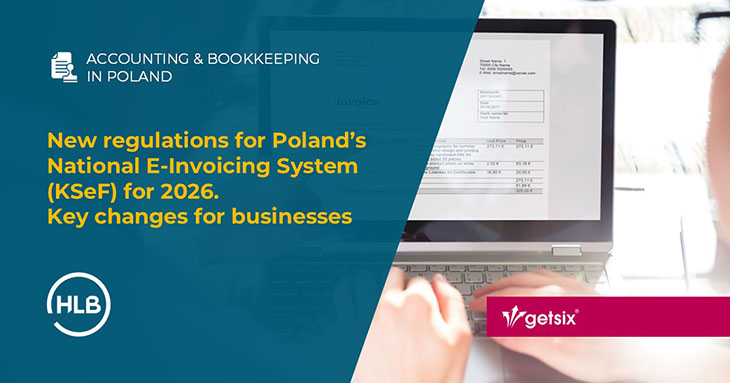Unlimited tax obligation in Poland
Individuals with their place of residence in Poland are taxed on their total income, regardless of where the income is earned (unlimited tax obligation in Poland). Individuals who do not have a place of residence in Poland are taxed solely on income earned in Poland (limited tax obligation in Poland).
An individual with a place of residence in Poland is a person who:
- is physically present in the Republic of Poland for more than 183 days during a tax year, or;
- has his center of personal or economic interests in Poland (center of vital interests).
The above rules are applied taking into account the provisions of relevant double taxation treaties. Therefore, even if, in the light of Poland’s national legislation, a person passes the residence test for Poland, the appropriate criteria contained in an international treaty must be applied to determine what country answers for that person’s actual place of residence for tax purposes.
Sources of revenue subject to PIT:
- a labor-based and an employment relationship, including a cooperative employment relationship, retirement or disability pension;
- personal services;
- non-agricultural business activity;
- special sectors of agricultural production;
- lease, sublease, tenancy, sub tenancy and other similar agreements;
- monetary capital and property rights;
- paid disposal of, among other things, real estate property or parts thereof and shares in properties and movables;
- other sources.
The Personal Income Tax Act does not apply to income derived from:
- agricultural activity, except for income from special branches of agricultural production, which is taxed under the rules set out in the PIT Act;
- forest management (within the meaning of the Forest Act);
- activities subject to the provisions on inheritance and donation tax;
- activities that cannot be the subject of a legally effective contract;
- the division of joint marital property resulting from the dissolution or limitation of marital property co-ownership, as well as income from equalisation of accrued assets after the termination of marital property separation or the death of one of the spouses;
- benefits intended to meet the needs of the family that are covered by marital property co-ownership;
- income subject to taxation under the tonnage tax regime.
Tax scale
Natural persons in Poland are subject to personal income tax calculated, as a rule, according to a progressive tax scale. Tax rates vary depending on the income earned, that is total income, minus tax deductible costs, earned in a given taxable year.
In 2025, we settle the PIT for 2024 according to the following tax thresholds.
| Taxable base in PLN | Tax | |
| more than | up to | |
| PLN 120 000 | 12% minus tax-reducing amount PLN 3600 | |
| PLN 120 000 | PLN 10 800 plus 32% on the surplus over PLN 120 000 | |
General information
The tax-free amount is up to PLN 30,000.
- 19% tax on income from non-agricultural business activity or from special branches of agricultural production – this form of taxation is chosen by submitting a written statement by the taxpayer. Income taxed under this method is not combined with income from other sources (Article 30c of the PIT Act).
- In the form of a lump-sum tax on revenue (Articles 29, 30, and 30a of the PIT Act) – such revenue is not combined with income from other sources.
- 19% tax on income from capital gains, e.g. from the sale of securities or derivative financial instruments – such income is not combined with income from other sources (Article 30b of the PIT Act).
- 19% tax on income derived from the sale of real estate and property rights (Article 10(1)(8)(a)–(c) of the PIT Act).
- 19% tax on income of a controlled foreign company (Article 30f(1) of the PIT Act).
- 19% tax on unrealised gains, when the tax value of an asset is determined (3% tax applies if the tax value is not determined) (Article 30da(1) of the PIT Act).
- 5% tax on qualified income derived from qualified intellectual property rights (Article 30ca(1) of the PIT Act).
Lump-sum tax rates on registered revenue
The rates of lump-sum tax on registered income in 2022, 2023 and 2024 are (pursuant to Article 12 of the Act of 20 November 1998 on lump-sum income tax on certain income earned by natural persons):
- 17% – on revenue earned from freelance professions
- 15% – on revenue from the provision of certain intangible services, including wholesale trade intermediation, advertising, and photography
- 14% – on revenue from services such as healthcare
- 12.5% – on the surplus of revenue exceeding PLN 100,000 from e.g. rental of real estate or accommodation services
- 12% – on revenue from services related to IT hardware consultancy
- 10% – on revenue from services involving the purchase and sale of real estate for own account
- 8.5% – on revenue from service activities, including revenue from catering services involving the sale of beverages with alcohol content above 1.5%, and revenue from rental or accommodation services, up to PLN 100,000
- 5.5% – on revenue from manufacturing activities and construction work
- 3.0% – on revenue from service activities in trade, as well as from catering services (excluding the sale of beverages with alcohol content over 1.5%) and interest from bank accounts related to business activity
- 2% – on revenue from the sale of non-industrially processed plant and animal products originating from the taxpayer's own cultivation, breeding, or rearing (with exceptions indicated in Article 20(1c) of the PIT Act)
Business activity
Natural persons conducting business activity are taxed according to the tax scale.
These individuals, at their request, may tax their income with a flat rate of 19% or a lump sum on registered income.
Depending on the scale of business conducted, upon meeting specific criteria, the taxpayer may request the application of simplified taxation forms, i.e.:
- tax on registered income (tax calculated without application of tax-deductible costs);
- a flat rate tax (tax determined by the tax office depending on the type of business).
The fourth form of taxation is the tax card (karta podatkowa); however, since 2022, only those taxpayers who continue to use this form of taxation — i.e. those who were already taxed in this way in 2021 — are allowed to benefit from it. Entrepreneurs starting a new business or planning to change their form of taxation are not eligible to use the tax card.
Tax rates – special types of revenue
The following income (revenue) categories are taxed in accordance with separate rules:
- private lease (at the taxpayer’s request – 8.5% tax on evidenced income);
- dividends (19% flat tax);
- interest on savings (19% flat tax);
- capital gains from the sale of securities (19% income tax);
- selling private properties (as a general rule, 19% income tax).
Some revenue categories disbursed by Polish withholding agents to non-residents are subject to a flat-rate tax of 20% of the revenue.
These include proceeds from:
- serving on management or supervisory boards;
- civil law agreements;
- entertainment or sports activity;
- accounting activity;
- legal and advisory services;
- advertising services;
- licence fees, know-how, or copyrights.
In the case of non-residents, tax rates resulting from a double tax treaty may be applied and withholding tax may be exempted from if the non-resident furnishes a certificate confirming the place of residence for tax purposes.
In the case of taxpayers who do not disclose their sources of revenue, income determined by the tax authorities is taxed at the penalty rate of 75%.
Tax credits
Personal income tax (PIT) payers may take advantage of a number of tax credits, such as:
- child tax credit;
- thermomodernisation relief;
- rehabilitation relief;
- Internet expense relief;
- relief for young taxpayers;
- abolition relief;
- R&D relief;
- relief for contributions to IKZE (Individual Retirement Security Account);
- monument restoration relief;
- payment terminal relief;
- robotisation relief;
- prototype relief;
- relief for working seniors;
- return relief (for returnees);
- large family (4+) relief;
- relief for investors in ASI (Alternative Investment Companies);
- expansion relief;
- sponsorship relief;
- donation to public benefit organisations;
- donation for blood donation;
- donation for religious purposes;
- donation for vocational education;
- donation for monument reconstruction;
- donations under other legal acts;
- loss carryforward deduction;
- social insurance contributions;
- health insurance contributions;
- trade union membership fee deductions;
Tax returns
The deadline for filing an annual tax return is 30 April of the year following the reference tax year. This rule does not apply to revenue subject to tax on registered income or a flat rate tax.
As a rule, taxpayers file their declarations separately. Spouses who are tax residents in Poland may, upon meeting certain requirements, file a joint tax return on taxable income according to the tax scale.
The following individuals are also permitted to file jointly:
- spouses with a place of residence in an EU Member State or within a Member State of the European Economic Area or Switzerland;
- spouses of whom one is subject to an unlimited tax obligation in Poland and the other having a place of residence outside Poland, but in another EU or EEA Member State or in Switzerland,
– provided that (in both aforementioned cases) they have reached the revenue threshold taxable in Poland in a total amount of at least 75% of the total revenue earned by both spouses in a given taxable year and have documented, with a certificate of residence, their place of residence for tax purposes.
Special rules of taxation apply also to individuals filing declarations as single parents.
Tax on inheritance and charitable donations
Scope of taxation
Tax on inheritance and charitable donations applies to the acquisition of ownership of assets located in Poland or property rights exercised in Poland by way of inheritance, bequest, further bequest, specific bequest, testamentary instruction, charitable donation, donor’s instruction, self-caption, or unpaid removal of shared ownership.
Tax is also applied to acquisitions of ownership of items located abroad or property rights exercised abroad if at the time of opening the inheritance or concluding a donation agreement, the acquiring party was a Polish citizen or had a permanent place of residence in Poland.
Taxpayer categories
Payers of tax on inheritance and charitable donations are grouped into three categories depending on the relationship with the donor/testator:
- group I: spouse, ascendants (parents, grandparents, great-grandparents), descendants (children, grandchildren, great-grandchildren), stepchildren, stepfather, stepmother, siblings, parents-in-law, son-in-law, daughter-in-law;
- group II: descendants of siblings (e.g. children of a brother), siblings of parents (e.g. uncles), descendants and spouses of stepchildren, spouses of siblings and siblings of spouses, spouses of siblings of spouses, spouses of other descendants (e.g. wife of a grandchild);
- group III: other entitled persons.
When acquiring assets or property rights through inheritance by a spouse, descendants, ascendants, stepchildren, siblings, stepfather and stepmother, the acquirer may benefit from a total exemption from inheritance and donation tax (does not apply to inheritances where the death of the testator occurred before 1 January 2007), if the acquisition of assets or property rights is reported, separately by each acquirer, to the relevant tax office within six months from the date when the tax obligation arose.
As of 1 July 2023, higher tax-free thresholds and new tax scales for inheritance and donation tax have been introduced. These changes were regulated by the Regulation of the Minister of Finance of 28 June 2023 on determining the value thresholds for items and property rights exempt from inheritance and donation tax and not subject to taxation, as well as the tax scales applicable for calculating this tax.
Tax rates
Currently, tax-exempt amounts are as follows:
- for acquirers from tax group 1 – PLN 36,120.00;
- for group 2 – PLN 27,090.00;
- for group 3 – PLN 5,733.00.
The tax scale is set out as follows:
| Taxable base in PLN | Tax scale | |
| more than | up to | |
| from acquirers from tax group 3 | ||
| - | 11,833.00 | 3% |
| 11,833.00 | 23,665.00 | PLN 355 + 5% of the surplus over PLN 11,833.00 |
| 23,665.00 | PLN 946.60 + 7% of the surplus over PLN 23,665.00 | |
| from acquirers from tax group 2 | ||
| - | 11,833.00 | 7% |
| 11,833.00 | 23 665 | PLN 828.40 + 9% of the surplus over PLN 11,833.00 |
| 23 665 | PLN 1,893.30 + 12% of the surplus over PLN 23,665.00 | |
| from acquirers from tax group 3 | ||
| - | 11,833.0 | 12% |
| 11,833.00 | 23,665.00 | PLN 1,420.0 + 16% of the surplus over PLN 11,833.00 |
| 23,665.00 | PLN 3,313.20 + 20% of the surplus over PLN 23,665.00 | |
Residency and its implications
A Polish PIT resident is defined as a person who: 1) has a center of personal or economic interests (a life interest center) within the territory of Poland, or 2) spends in Poland more than 183 days in a tax year. It is enough to satisfy one of these conditions to become a Polish resident.
Polish tax residents pay Polish personal income tax on their worldwide income. Double taxation issues are resolved based on the relevant Double Tax Treaty; if no Treaty applies to a particular case double taxation is avoided based on domestic provisions (generally, income tax paid abroad can be proportionally credited against Polish PIT liability).
Non-residents are subject to Polish tax on their Polish-sourced income only. Furthermore, in numerous cases, non-residents can benefit from a 20% flat tax rate calculated on their revenues (i.e. with no deduction of costs). The above flat tax applies to various sources of income, including management fees (but not to employment contracts).


















